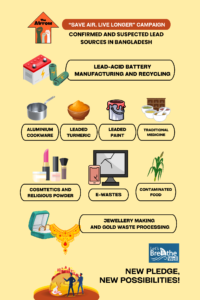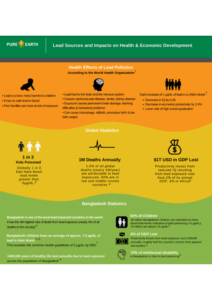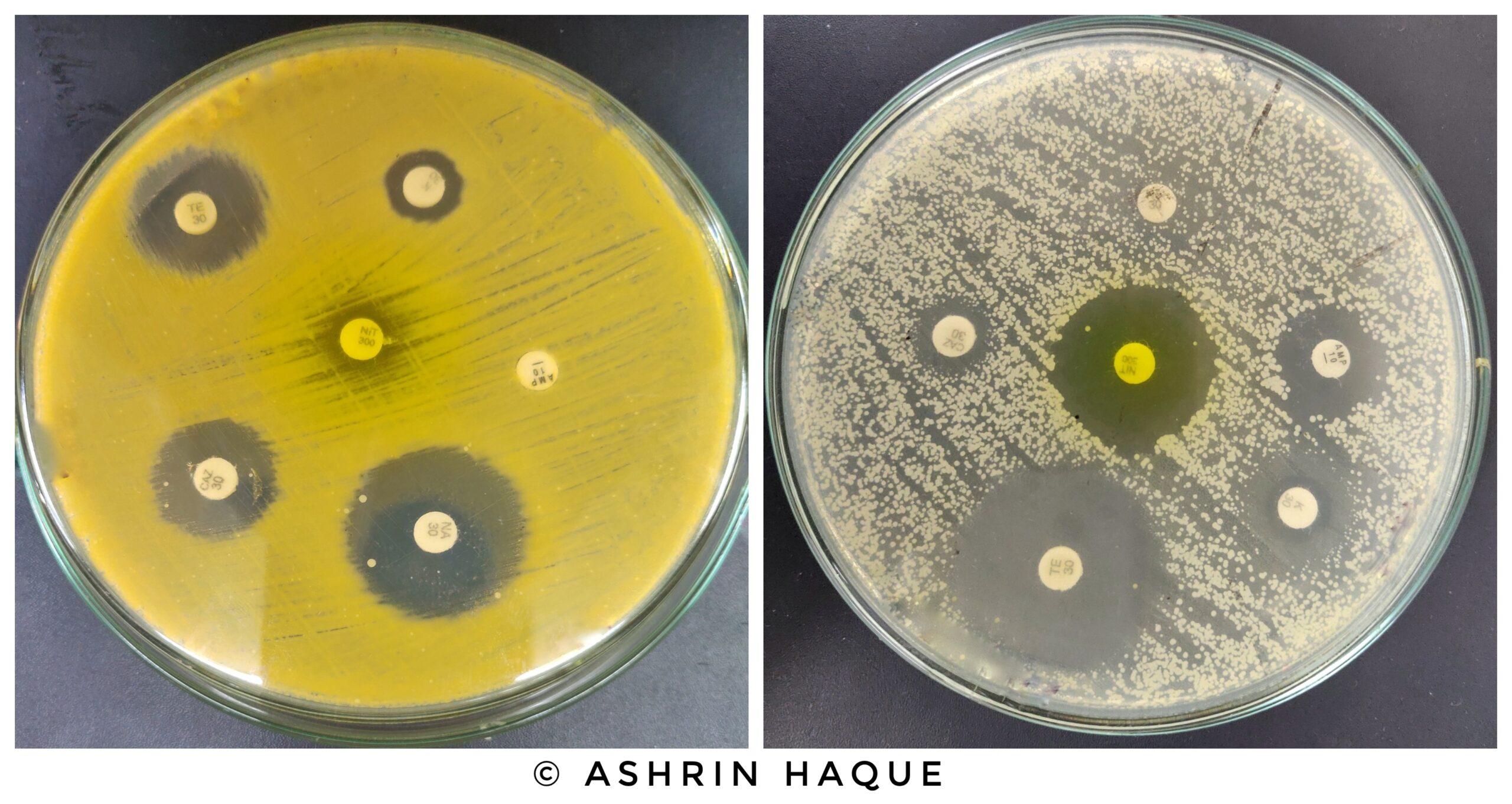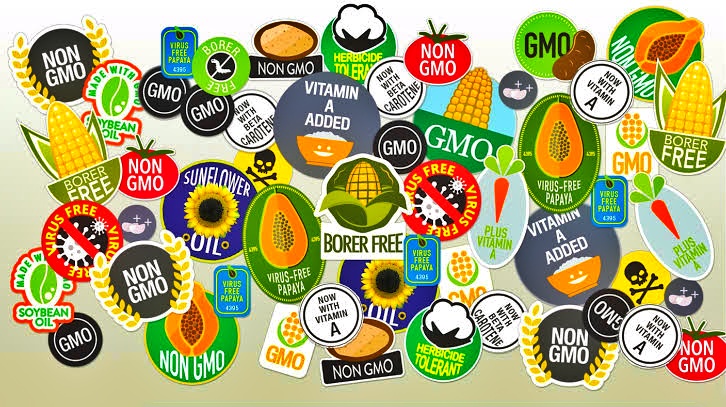[This article is part of the campaign named Let’s Breathe Well Clean Air Campaign Design Challenge, organized by the United Nations Development Programme (UNDP) – Bangladesh, where “The Airrow” is collaborating with Learnlifescience to reach a greater audience both domestic and international.]
In the last few years, the use of lead in Bangladesh has increased drastically as the country went through an economic and financial boom. More progress means more demand, such as more cars, which means more fuel, and more fuel leads to more gasoline combustion. But, the recent activities compelled unqualified proletariats like us to come forward and talk with our countrymen about how the air is being polluted because of heavy metals, the risks, and the solutions. Before I begin, I hope the words of the language will allow me to share a story. Mark Twain, the great American writer, once stole a watermelon from a wagon in his youth. He came home to his younger brother, and when they were trying to divide the spoils of thievery, they found out the watermelon was not ripe. Therefore, Mr. Twain went back to the master of the watermelon and inoculated with a sorrowful rage, “You ought to be ashamed of yourself for letting me steal that watermelon.” Yes, I’m shadowing our consensus here. We all know what kind of existential crisis we are in, but we are blaming it all on an “alien” that we made up. Now, the victimized readers of this article can go to the internet and challenge me on the basis that air pollution is not one of the major crises. It is not even in the top 5 crises in the world. But what gives us the right to ignore it? Just because it is not a major crisis now, does this mean we should take it to its limit and then hope something worse can come up? (I’m rooting for nuclear war.) Readers, I hope you do not read this article in silence where I present a short analysis of air pollution by heavy metals. So, let us have a discussion. A few days ago, the government tried to ban battery-powered rickshaws, which resulted in massive backlash. Before we blame it on the watermelon, let me point out that these batteries are made from used electric products, and during that mechanism, lead gets vaporized at a higher rate. This is a grave concern because we are putting children’s health at risk for some toilet-like commercialism (Sen et al., 2021). This is just one story; more can be seen written by the brave journalists who are reporting this. So, what can we do now?

Figure 1: The major sources of lead in Bangladesh.

Figure 2: The dire consequences of too much exposure of lead in the air.
This is just one story; more can be seen written by the brave journalists who are reporting this. So, what can we do now? Dear readers, I understand that we are in a paralyzed state, but I still believe this is a “fear itself” situation, and this is where “The Airrow” comes in. I am quite sure that our promises are not new, unique, or dynamic when it comes to changing people’s lives. Therefore, we pledge to give you a new deal with new possibilities. As the first preliminary institution, we are lobbying for a more centralized system where follow-up studies and statistics can be stored, which may allow more distinguishing research.

Figure 3: “The Airrow” building up a foundation.

Figure 4: The targeted audience at Brac University.
We plan to preach our initiatives domestically and then in nationwide correspondence to people belonging to every class. We are further proposing a more sustainable waste management model supported by experts, which can reduce heavy metal waste in the country. This is just a glimpse of our pledges. There is more to come. All we need is your consensus. If my team, “The Airrow,” fails to achieve this, then there is only one way. So, if we face any grave danger because of air pollution in the future, I would suggest you blame it all on America and its corn production (Coppess, 2018). Well, America is the biggest producer of corn in the world, but only 1% of it can be used as food. The rest goes for feedstocking or being used as vehicle fuel, etc., which contributes the most to increasing the concentration of greenhouse gasses in the atmosphere. Yes, my dear readers, you are correct in your sincere judgment. The corporate circle of Bangladesh did pledge to increase the use of renewable fuels by 2030, but guess what kinds of mechanisms they will follow, and can we blame them? The business model is cheap, and the country has a lust for a free market system. So, this is the watermelon story all over again.
I should stop writing now.
References:
1) Annex F: Final Lead Health Roadmap Strategy Paper.pdf. (n.d.). Google Docs. Retrieved May 25, 2024, from https://drive.google.com/file/d/1xokcbjhbJa5Fo4d8CmG2-JRmaFbJD4S5/view?fbclid=IwZXh0bgNhZW0CMTAAAR3LcU_f1fM1UX55N4gy1erubll42G4HxC2EmF5yPmol99mWZ8vJcoXDcx0_aem_AZaUbWy0BDUboik13hdj7QnwmuhfIUiahG1fK92GFHOxgY52tZ9Vx4vyfqx91jZpFtBCTGLE3pLxOhDJYax-jdlX
2) Coppess, J. (2018). The fault lines of farm policy a legislative and political history of the farm bill. Lincoln University Of Nebraska Press.
3) Sen, R., Thacker, H., Roy, A., Shete, R., Jadhav, A., Raj, C., Sawant, M., & Patil, V. (2021). Fast Charger for Lead Acid Motive Power Batteries for E-Rickshaw. International Journal of Sustainable and Green Energy, 10(4), 121. https://doi.org/10.11648/j.ijrse.20211004.12
Description of the Group:
The Airrow, representing BRAC University, working with an awareness campaign: “বাতাসকে বাঁচান, বেশিদিন বাঁচুন” in Dhaka, Bangladesh on a trial basis. This competition named Let’s Breathe Well Clean Air Campaign Design Challenge, is Organized by the United Nations Development Programme (UNDP) – Bangladesh. This article is part of the campaign where The Airrow is collaborating with Learnlifescience to reach a greater audience both domestic and international.
“Since the article has been written to reflect the actual views and capabilities of the author(s), they are not revised for content and only lightly edited to be confirmed with the Learn life sciences style guidelines”










